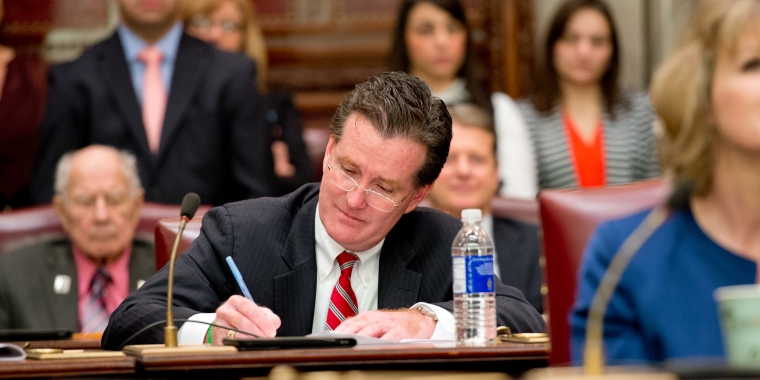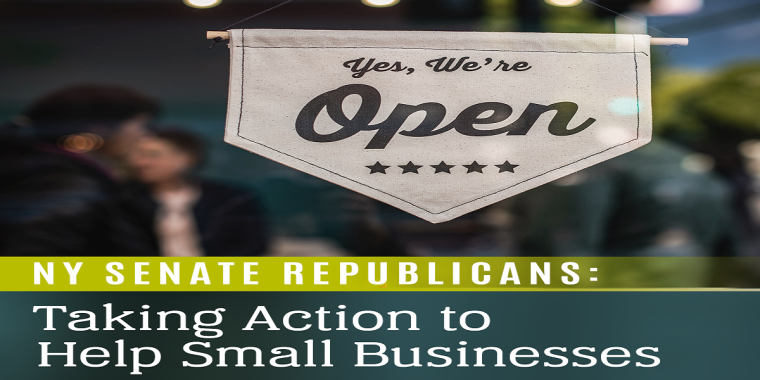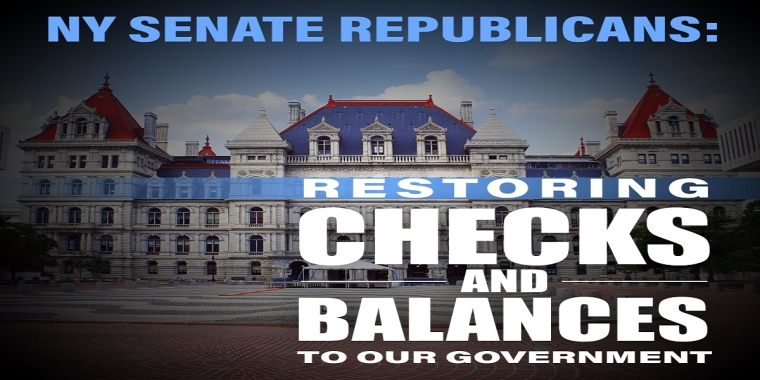
Senate Finalizes 2018-19 State Budget That Rejects $1 Billion In New Taxes, Protects Existing Tax Cuts, Provides Record Funding For Schools And Opioid Abuse Prevention
March 31, 2018

The New York State Senate has completed passage of the 2018-19 state budget that achieves key objectives to promote affordability, opportunity, and security for hardworking taxpayers. The final budget maintains fiscal discipline by keeping within the self-imposed two-percent spending cap and closes a $4.5 billion deficit, while also preventing billions of dollars in new taxes and fees to protect taxpayers and encourage economic growth.
Senate Majority Leader John J. Flanagan (2nd Senate District) said, “This budget invests in the shared priorities of hardworking New Yorkers - affordability, opportunity, and security. It is a solid and fiscally responsible budget that protects taxpayers, creates jobs, and supports many other quality-of-life issues important to middle-class families across the state.”
The New York State Senate has completed passage of the 2018-19 state budget that achieves key objectives to promote affordability, opportunity, and security for hardworking taxpayers. The final budget maintains fiscal discipline by keeping within the self-imposed two-percent spending cap and closes a $4.5 billion deficit, while also preventing billions of dollars in new taxes and fees to protect taxpayers and encourage economic growth.
The $168.3 billion budget rejects $1 billion in new taxes and fees proposed in the Executive Budget and helps reduce the state’s high cost of living; provide record levels of funding for education, the environment, and opioid abuse prevention; and address the serious public health and safety challenges facing the state’s communities. Highlights include:
AFFORDABILITY
Maintaining Fiscal Discipline
The budget protects taxpayers by adhering to a self-imposed two-percent spending cap for the eighth year in a row. Adhering to the cap was instrumental in helping eliminate a $4.5 billion deficit expected to face the state this year. Capping state spending has saved taxpayers nearly $52 billion on a cumulative basis since the 2010-2011 budget.
Rejecting Tax and Fee Increases
The Senate led the successful fight to reject $1 billion in onerous tax-and-fee increases proposed by the Governor and billions more proposed by the Assembly, including new taxes on internet purchases and new DOT fees. The final budget also protects the continued roll-out of the landmark $4.2 billion Middle Class Income Tax Cut that began taking effect in January and will reduce tax rates on middle class families and thousands of small businesses by 20 percent over the next several years.
Protecting and Expanding STAR Property Tax Relief
The Senate made it a priority to build upon the highly successful property tax cap that has already saved taxpayers $23 billion and worked to ensure the Governor’s proposed cap on STAR property tax relief benefits was rejected, saving $49 million. The budget also extends the property tax rebate check program and many homeowners will see their rebate checks double to an average of $380 this year and $532 next year.
Protecting Taxpayers from Negative Impacts of Federal Tax Changes
The budget follows the Senate’s lead in decoupling the state and federal tax codes to prevent New Yorkers from taking a $1.5 billion state tax hit as a result of recent federal tax changes. It holds harmless New Yorkers who may have to pay more in state income taxes because of the changes at the federal level and prevents the state from benefitting from the sudden revenue increase at the expense of taxpayers.
Making Retirement More Affordable and Accessible for Private Sector Employees
The budget creates a program that provides a simpler way for private employees to save up for retirement through voluntary payroll deductions. Many small business owners and job creators in New York currently face costly administrative and financial barriers to providing retirement savings plans to their employees. This program would give employers, on a completely voluntary basis, the opportunity to utilize existing state administrative resources to help workers that choose to participate in the program and contribute to Roth IRAs to help them save for their future.
Protecting New Yorkers from Overpaying for Prescription Drugs
A Senate initiative passed earlier this year to protect consumers from unfair prescription drug pricing is included in the budget. The reforms help consumers become better informed about the price of drugs and prohibits two costly practices – gag clauses and clawbacks – used by pharmacy benefit managers (PBMs). Prohibiting these costly practices will help fight the rising cost of prescription drugs for all New Yorkers.
OPPORTUNITY
Keeping $700 Million in Brownfield, Historic, and Other Business Tax Credits In Place
The final budget prevents the deferment of tax credits including the state’s Historic Tax Credit and Brownfield Cleanup Tax Credit programs so that private investment in under-developed communities is not jeopardized. These credits and all but five of the state’s other business tax credits would have been deferred for multiple years under the Executive Budget proposal, but the Senate fought to save the $700 million in credits so that they can continue to promote business growth, create jobs, and revitalize communities.
Growing NY Strong
Together, the Senate and Assembly succeeded in restoring and adding more than $13 million beyond what the Executive proposed for agriculture programs, totaling $54.4 million. This year’s total funding is an increase of over $3 million from last year. Dozens of programs - investments in cutting-edge agricultural research, support for the next generation of family farmers, environmental stewardship, and protections for plant, animal, and public health – will be funded, with significant increases including:
- $1.5 million, for a total of $1.9 million, for the Farm Viability Institute to help New York’s farmers become more profitable and to improve the long-term economic viability and sustainability of farms, the food system, and the communities which they serve;
- $1 million, for a total of $9.28 million, for Agri Business Child Development Program, to provide quality early childhood education and social services to farm workers and other eligible families;
- $1 million, for a total of $5.43 million, for Cornell Diagnostic Lab;
- $1.1 million for Taste New York, including $550,000 for the New York Wine and Culinary Center;
- $750,000 for Farm-to-School programs;
- $544,000, for a total of $750,000, for the Apple Growers Association;
- $500,000 for the Farm-to-Seniors Program;
- $300,000 for the North Country Farm-to-School Program;
- $225,000 for Maple Producers; and
- $138,000 for EBT at Farmers Markets.
In addition, the Senate again secured $5 million to support local county fairs and $5 million for animal shelter improvements.
Preparing Workers for Successful Careers
The budget provides key investments in job training and workforce development initiatives so New Yorkers can enhance their job skills – providing a pathway for new opportunities, financial security and career success. Specific highlights include:
- $5 million for the Next Generation Job Linkage Program that assists employers in identifying potential jobs, defining their necessary skills and providing employees with the appropriate training;
- $5 million for the SUNY/CUNY Apprentice Initiative, a targeted training initiative that helps employers refine the skills of new hires and enables more experienced employees the chance to upgrade their skills;
- $4 million for the Workforce Development Institute (WDI), a highly successful not-for-profit that works with businesses and the AFL-CIO to provide focused training for workers and for workforce transition support to help stop the outsourcing of jobs to other states. An additional $3 million is also provided for WDI’s Manufacturing Initiative;
- $3.6 million for Business and Community College Partnerships that support innovative, specifically-tailored workforce training programs coordinated between individual businesses and community colleges; and
- Increased support for Early College High Schools to help prepare students for college-level coursework that promotes future academic performance and enables students to get their high school diplomas while also earning free associate degrees for high-skilled jobs or taking other college credit-bearing courses.
Increasing Education Funding to Help Children Succeed
The final education budget includes record support for schools of more than $26 billion, including an increase of $1 billion over last year. This four-percent increase continues the Senate’s commitment to funding education at a rate higher than the growth of the rest of the budget. Other highlights include:
- Nearly doubling the Governor’s Foundation Aid proposal with $281 million in additional funding, for a total increase of $619 million in 2018-19;
- Fully funding expense base aids at $240 million;
- Increasing funding for charter schools;
- Increasing funding for STEM programs in non-public schools by $10 million for a total of $15 million;
- Continuing $15 million in security grants for non-public schools;
- Restoring a $7 million cut in the Executive Budget for non-public school immunization funding;
- Creating the “No Student Goes Hungry” program to provide students of all ages, backgrounds, and financial situations access to healthy, locally-sourced meals to address child hunger. It includes an expansion of the Farm-to-School Program to utilize locally-grown, quality meals, which will support local agriculture and an improved learning experience for children.
Preparing Students for Bright Futures Through Higher Education
The final budget provides $7.6 billion to support higher education in New York. Among the highlights are record-high levels of more than $1 billion in funding for tuition assistance and financial aid this year; a restoration of $35 million for Bundy Aid; and an overall funding increase in base aid funding for community colleges by $18 million - $12 million for SUNY and $6 million for CUNY - to help prevent tuition hikes. It also includes $200 million for educational opportunity programs and the Collegiate Science and Technology Entry Program (CSTEP), among others, and restores $200 million in Executive Budget cuts to SUNY and CUNY’s capital programs. To help working parents succeed in school, $2 million was restored for child care centers at community colleges, and to support New York’s Bravest, firefighters would be allowed to take up to one CUNY course that pertains to their line of work for free, similar to what police officers are currently offered.
Promoting Economic Growth Through Infrastructure Investments
To ensure New York has the infrastructure in place to attract and expand businesses, the Senate has secured $122 million in new capital funds to support investments in transportation, environmental mitigation, aviation, and other economic development-related infrastructure projects throughout the state.
Providing Safe, Reliable Transportation
To help localities repair and rehabilitate local roads and bridges, the enacted budget provides an additional $65 million in one-time Consolidated Local Streets and Highway Program (CHIPS) funding for extreme winter recovery, for a total of $503 million.
The budget also supports the Metropolitan Transportation Authority with a $334 million - 7 percent – increase in funding over last year for a total of more than $4.8 billion in operating assistance. This includes $254 million to fully fund the state’s half of this year’s $418 million obligation towards the $836 million Subway Action Plan, with New York City responsible for contributing the remaining half.
There is an additional $20 million in non-MTA transit capital, for a total of $104.5 million for 2018-19, and a two percent increase in state operating assistance to all non-MTA systems, for a total of $530 million.
SECURITY
Providing Record Support for Heroin and Opioid Abuse Prevention and Treatment
The Senate secured a major increase in funding to combat the opioid epidemic for a new record investment of $247 million – $20 million above the 2018-19 Executive Budget proposal, and $37 million above 2017-18. Among the highlights are:
- $10.6 million to support services including more residential treatment beds, a new Recovery and Community Outreach Center, and an Adolescent Clubhouse program to provide peer support activities and events that help maintain a sober and substance-free lifestyle;
- $3.8 million for the development and implementation of substance use disorder treatment in local jails; and
- $1.5 million for the creation of an Independent Substance Use Disorder and Mental Health Ombudsman to assist individuals in receiving appropriate health insurance coverage.
In addition to record funding, the budget includes a Senate-driven initiative to help prevent and address an increase in the number of babies born addicted to opioids. The budget creates a new program and provides $1 million to further educate and assist health care providers in caring for expectant mothers and new parents with substance use disorders and help ensure they receive appropriate care, with an additional $350,000 provided for infant recovery centers.
It also prohibits prior authorization for outpatient substance abuse treatment to ensure people are able to get the help they need immediately. And the budget makes permanent the state’s certified peer recovery program, where those in recovery utilize their expertise and experiences to promote the success of others battling substance abuse.
To help increase the tools available to law enforcement to get dangerous drugs off the streets, the budget adds two new derivatives of fentanyl and several new hallucinogenic drugs, synthetic cannabinoids, and cannabimimetic agents to the state’s controlled substances schedule.
Preventing Sexual Harassment in the Workplace
The Senate Majority has taken a leadership role to create safer workplaces free of sexual harassment and abuse, including passing comprehensive legislation earlier this month. As a result of the Senate’s strong advocacy on this issue, the final budget measure:
- Prohibits secret settlements unless the victim requests confidentiality;
- Prohibits mandatory arbitration for sexual harassment complaints;
- Protects non-employees in the workplace;
- Creates a uniform sexual harassment policy and training for businesses as well as state and local governments;
- Requires all state contractors to submit an affirmation that they have a sexual harassment policy and that they have trained all of their employees; and
- Protects taxpayer funds from being used for individual sexual harassment judgements.
Helping Survivors of Rape and Sexual Assault
New requirements included in the budget ensure untested rape kits are stored for 20 years, an increase from the current 30-day requirement. This will address serious concerns about the current lack of long-term storage for untested rape kits and will increase the ability of rape and sexual assault survivors to get justice. The state will develop a plan to identify a location that will house untested forensic rape kits for 20 years and develop a system for those kits to be tracked by survivors. In addition, rape survivors will not ever have to pay any costs, including insurance co-pays, for a rape examination or hospital visit.
An additional $147,000 was added by the Legislature to support Rape Crisis Centers, for a total of nearly $6.5 million. These measures build upon recent laws championed by the Senate over the last few years to provide funding and make sure New York State is testing all rape kits, no matter how old, and including DNA evidence in the national CODIS database so matches can be made and criminals brought to justice.
The budget includes $300,000 for a Senate initiative that establishes a Sexual Assault Forensic Examiner (SAFE) telehealth pilot program to ensure providers are able to properly conduct sexual assault examinations at facilities that do not have a designated SAFE program. The provider would be linked by telehealth to a SAFE profession to help care for the victim and make sure evidence is protected.
Preventing “Sextortion”
The budget includes a measure to help prevent sex-related crimes and protect victims from extortion by creating new penalties for the act of sexual coercion – also known as “sextortion.” Anyone threatening a victim’s health, safety, business, career, financial condition, reputation, or personal relationship in exchange for sexual acts will face new felony-level charges.
Combatting Gang Violence
The final budget provides $500,000 to local law enforcement to support youth outreach programs that help prevent MS-13 or other gang violence in Nassau and Suffolk counties. An additional $5.8 million was secured by the Senate in the budget for other local law enforcement initiatives including equipment and technology enhancement, and anti-drug, anti-violence, crime control and prevention programs.
IMPROVING PUBLIC HEALTH AND NEW YORKERS’ QUALITY OF LIFE
Building Healthier Communities
The budget includes $525 million – an increase of $100 million over the Executive Budget proposal - for the Health Care Facility Transformation Program to boost a new third round of awards and help ensure long-term sustainability for facilities as they adjust to the changing dynamics of health care in New York. In addition, the budget provides extensive supports for a variety of important public health initiatives including:
- $27 million for Nutritional Information for Women, Infants and Children;
- $27 million for Alzheimer’s and other dementia related programs;
- $21 million for cancer services;
- $16 million for maternal and child health programs;
- $13 million for chronic disease prevention (including diabetes, asthma, and hypertension);
- $11.2 million for the Doctors Across New York Program;
- $8.5 million in additional funding of the Spinal Cord Injury Research Board;
- $5 million for crucial women’s health initiatives;
- $2.5 million to support organ donation; and
- $283,000 for the Adelphi Breast Cancer Support Program.
Investing in Women’s Health
The Senate Majority successfully advocated for more than $4.5 million in new state funding to enhance women’s access to quality medical care. The budget restores a $475,000 cut the Executive proposed and includes the additional commitment for a total of $5 million that will be used to support initiatives like breast cancer prevention, education, and support, and prenatal and postpartum services, among others.
Preventing Lyme Disease
The Senate’s Task Force on Lyme and Tick-Borne Diseases was once again instrumental in securing a record amount of funding to support education and prevention efforts. The budget restores $400,000 in Executive Budget cuts and includes $600,000 in new funding, for a total of $1 million to support the Task Force’s recommendations.
Protecting the Environment and Critical Water Resources
The Senate continues its longstanding support for the Environmental Protection Fund at a record $300 million. It continues the implementation of last year’s historic $2.5 billion Clean Water Infrastructure Bond Act and supports important initiatives to protect drinking water quality and environmental health, including:
- $65 million to combat harmful algal blooms in Upstate New York waterbodies
- $1.5 million for the Center for Clean Water to help address 1,4-Dioxane – an increase of $500,000 to support additional lab testing equipment;
- $250,000 for the Adirondacks Lake Survey Corporation;
- $200,000 Long Island Commission for Aquifer Protection;
- $200,000 to the Town of Geneva for a Seneca Lake Watershed Manager;
- $150,000 for the Chautauqua Lake Association; and
- $125,000 for water quality monitoring in Manhasset Bay, Hempstead Harbor, Oyster Bay Harbor, and Cold Spring Harbor.
The Senate also included a measure in the budget to require the state Department of Health to establish a statewide plan for examining lead service lines to help reduce harmful lead exposure. The plan would include an analysis of lead service lines throughout the state and a plan for replacement.
Assisting Lake Ontario Communities
The Senate succeeded in providing $40 million in new budget funding to assist owners of residences still needing repairs to property impacted by last year’s historic flooding of Lake Ontario, St. Lawrence River, and their connected waterways.
Bolstering Libraries
The budget continues the Senate’s longstanding support for libraries and the community resources they provide by securing $5 million in operations funding above the Executive Budget and $10 million in additional capital funding for a total capital increase of $20 million.
Supporting New York’s Seniors
The budget reaffirms the Senate’s strong commitment to a wide array of programs and initiatives that serve New York’s senior community so that they can continue leading healthy, secure, and fulfilling lives, including funding for the following:
- $50 million for the Expanded In-home Services for the Elderly Program;
- $31 million for Community Services for the Elderly Program;
- $27 million for the Wellness in Nutrition Program;
- $27 million for Alzheimer’s and other dementia related programs;
- $250,000 for Older Adults Technology Services;
- $132,000 for the Senior Action Council Hotline; and
- $86,000 for the New York Foundation for Seniors Home Sharing and Respite.
In addition to these funds, the Senate remains committed to stopping elder abuse by including $1.2 million to support elder abuse prevention initiatives, and this year’s budget provides funding for a three-hour extension of Adult Protective Services Call Center hours as an additional resource to report suspected cases of elder abuse. The budget also makes the Residential Emergency Services to Offer Home Repairs to the Elderly (RESTORE) program permanent, and continues $1.4 million for this initiative that assists low-income, elderly homeowners eliminate unsafe conditions in their home.
This year’s budget also fully funds New York’s vital Elderly Pharmaceutical Insurance Coverage (EPIC) program at $132.6 million to help cover seniors’ prescription drug needs. It also fully funds the state’s Enhanced STAR school tax relief program for seniors, totaling $865 million.
Helping Our State’s Veterans
The Senate Republican Conference’s support for the heroic men and women in our nation’s military is unwavering. The 2018-19 State Budget reflects this commitment by including:
- $645,000 in additional funding to expand the Joseph P. Dwyer Veteran Services Peer-to-Peer Program to an additional seven counties. Total funding for this successful program, which is based on veterans helping veterans, is now $3.7 million and reaches 23 counties;
- $500,000 for the NYS Defenders Association Veterans Defense Program;
- $250,000 in additional funding for the Veterans Outreach Center in Monroe County, for a total of $500,000;
- $450,000 for the Veteran's Mental Health Training Initiative;
- $220,000 to fund the Veterans Defense Program to Long Island
- $200,000 for Legal Services of the Hudson Valley Veterans and Military Families Advocacy Project;
- $200,000 for Warrior Salute;
- $100,000 for the Veterans Justice Project;
- $100,000 for the SAGE Veterans Project;
- $50,000 for the Vietnam Veterans of America New York State Council;
- $200,000 for Helmets-to-Hardhats;
- $25,000 for the Veterans Miracle Center; and
- $125,000 for Veterans of Foreign Wars NYS Chapter Field Service Operations.
The budget also expands the eligibility criteria for veterans to participate in the state's Home for Heroes program, which helps remove barriers to accessible and affordable housing for veterans with disabilities.



